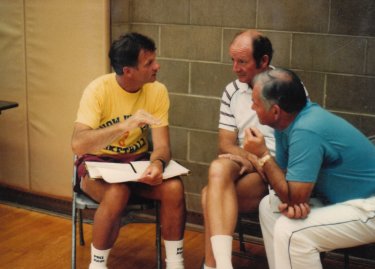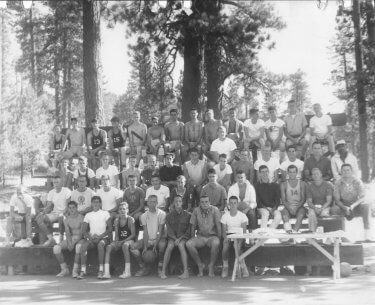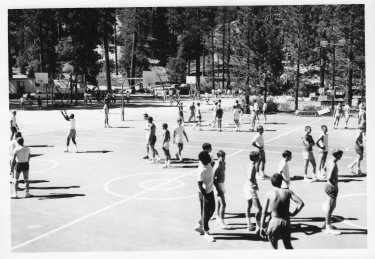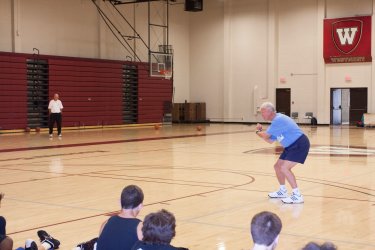(This four-part article describes the legacy of the Snow Valley Basketball School on coach development and the game of basketball)
————
A Passion for Teaching Fundamentals
Herb Livsey still operates in the shadows of basketball legends, canvassing the globe for basketball talent. For 21 years, Livsey has served as a scout in the National Basketball Association (NBA), a role often filled by the keenest of basketball lifers and hidden from the fast-paced, social media driven limelight of NBA culture. But, out of the public eye the 83-year old basketball savant has been shining a fatherly glow on the game of basketball and basketball coaches for more than 60 years.
As director of the famed Snow Valley Basketball School in California from 1961 to 2001, Coach Livsey advanced the basketball skills of thousands of young people in the United States and overseas. He connected with and nurtured the talents of hundreds of basketball coaches. Livsey’s contributions changed how the game of basketball is taught, perhaps making him the greatest developer of coaches in the history of the sport.

Herb Livsey (yellow shirt). Photo credit: Steve Middleton
Livsey’s story is one of passion, commitment, and making a difference. It all began in New Hampshire during the summer of 1956 and 57. Livsey was a 19-year old counselor at Camp Graylag, a traditional boys‘ summer camp. In 1952, Hall of Fame and NBA legend Bob Cousy became a partner in the camp and established a focus on basketball (Graylag Cabins, 2018). Unlike many summer camps, a basketball camp followed the conclusion of the traditional camp. Livsey fondly recollects a conversation with Cousy, “Bob called me into the office and said, ‘would you like to stay?’ I’m 19 and he says would you like to stay and coach one of the teams… I thought I had died and gone to heaven.” Cousy agreed to pay him twenty-five dollars.
Since Cousy’s camp was one the few basketball camps in the country in the late 1950’s he needed to hire coaches to teach basketball skills. Cousy contacted two teachers of the game, former Boston Celtic teammates, Tommy Heinsohn and Bill Sharman. Both Sharman and Heinsohn would later be inducted into the Basketball Hall of Fame: Sharman as a player and a coach. Livsey reflects on the experience with a hint of awe. “Here I was, a 19-year old kid and I was on that staff and Bob gave me 16-year old kids and he watched over my shoulder, so I would be okay…I carried Bill Sharman’s bags from his car to his cabin and we were friends the rest of our lives…Bob Cousy and Bill Sharman were my early influences. Bob with the camp and Bill with the coaching and fundamental play and being a solid player.”
The experience at Camp Graylag set the stage for Livsey’s future. His life was moving forward. He was engaged to be married and had been accepted to the graduate program at the University of Nevada-Reno. Before heading west, Livsey was impacted by Cousy’s parting words. “He (Cousy) said to me as I was leaving that summer…if you ever had a chance to own a camp, I have never had a young man love this environment more that you do.”
Newly married, the Livseys began a life together in Northern California. Having completed his graduate work, Herb was teaching and leading a high school team. Not long into the experience, he heard about a basketball camp being developed in Southern California, tucked in the San Bernardino Mountains. Although he originally only wanted to work the camp, he ended up buying 25% of the camp and a year later he bought out the other three owners. Thus in 1961 at the Snow Valley Ski Resort in Running Springs California, the Snow Valley Basketball School was born.

Camp photo 1961. Photo credit: Steve Middleton
A Day at Camp
Attending a Snow Valley Basketball camp as a player can be a life-altering experience. Basketball consumes the day, with three meals and a short slumber. A typical day at the camp begins when camp directors wake sleepy eyed youth and push them towards the gym for a 5:45 AM session. Camp coaches await campers in the gym; the early risers sipping a cup of coffee, the night owls arriving just in time. The early session sets the tone for the day. Then campers fuel up with breakfast at 7:00 AM and return to the courts for a full day of instructional clinics. Morning clinics center on defense. As the day progresses, sessions shift to individual skill work with a focus on offense.
The philosophy at the Snow Valley Basketball School is teaching the fundamental skills of basketball. The schedule is designed to challenge youth to step out of their comfort zone. Replacing old routines with new habits. Each camper will have a team, but a minimal amount of time is set aside each day for team practices. There is only one game a day. Thus, the competition against one’s peers becomes the reward after a day of instruction. Campers and coaches share this sentiment. Drained after a day of instruction and physical activity, campers and coaches ignore lingering soreness and blistered feet. Fatigue, whether real or mentally self-imposed is placed aside. Suppressed competitive juices are released. This is the one moment they can let loose, practice new skills, or revert to old habits. The evening games, often running past midnight, hold some of the camp’s greatest stories.
Herb Livsey
The Snow Valley Basketball School weaved nicely into Livsey’s professional career as a teacher and coach. Livsey is an educator by trade, earning a B.A. in English, a B.S. in Physical Education from Florida Southern College and a master’s degree in both English and Physical Education from the University of Nevada-Reno. A high school teacher and coach during the 1960’s, Herb was hired at Orange Coast College (OCC) in 1969 and spent 27 years teaching English, the first seven years (1969-1976) he served as the head men’s basketball coach (Carnett, 2007).
Livsey held a variety of basketball coaching positions between 1977 and 1997 while teaching at OCC. After retiring in 1997, he became a scout for the Portland Trailblazers (1998-2004), Atlanta Hawks (2004-2008), and then the Denver Nuggets in 2008 – a position he still holds today (Lopez, 2014). In 1994, Livsey was inducted into the Southern California Interscholastic Basketball Coaches Association Hall of Fame and in 1998 into the California Community College Hall of Fame. The National Association of Basketball Coaches honored him for his service to the game at the 1990 NCAA Final Four.
Livsey’s passion for teaching and people drove him to create the Snow Valley Basketball School. He believed the camp had to be run a certain way with a hands-on approach. In the early years, Livsey would paint court lines on the parking lot surface, help build bleachers, and assist in the construction of backboards. His presence etched into every aspect of the camp from ensuring youth would not sneak out of their dorms at night, to early morning (2 AM) planning sessions preparing for the next day. Livsey assigned and organized coaches based on teaching ability and evaluated them to ensure learning was taking place.

Photo credit: MD Janiska (https://www.instagram.com/md_janiska/)
Legend has it that Herb was so intent on creating a peak learning environment he once told a young man working for the ski resort to silence his chainsaw because it was making too much noise and distracting the campers. Considering he was not his boss, the worker who was simply following orders to trim some trees on the ski slope, was baffled by the insistence of Livsey’s words and demeanor. The interaction created some tension with the resort owners but demonstrated Livsey’s commitment to creating a culture of learning. It was a culture driven by Livsey’s passion and attention to detail and an approach he used in hiring coaches. He took pride in finding great teachers. Livsey’s goal was simple, hire the best teachers of the game and make Snow Valley the best fundamental basketball skill camp in the country.
Building his Vision
In the early 1970s while attending a local high school game of a player he was recruiting, Livsey became impressed with the defense being orchestrated by the opposing coach, Clete Adelman. Soon after the game, Adelman remembers getting a phone call from Herb Livsey. “I had never met him, and he gets on the phone and was very direct and spoke quickly, ‘This is Herb Livsey, I want you to come and teach my basketball camp, Snow Valley Basketball School,’” recalls Adelman, “He said it fast and that was all he said.”
One of Livsey’s greatest recruits, Adelman starting working Snow Valley in 1973 and continued to work the camp for 41 years, moving into an administrator’s role in 1990 then part owner in 2002, until selling his ownership stake in 2014. A demanding and passionate coach, Adelman spent 27 years as the head coach at MiraCosta College (CA) and continues to value his role as a teacher of the game.
In seeking the best teachers of the game, Livsey recognized that the energy and passion of a young coach could be nurtured. If a coach wanted to be a good teacher – they could be. Thus, through relationships he had built over the years, coaching friends would recommend other coaches to him. Wayne Carlson worked his first Snow Valley camp based on a recommendation from the head coach he worked under at San Diego Mesa College (CA), who was friends with Livsey. Due to the connection, Livsey took a chance on Carlson and hired him in 1975. For the next 41 years Wayne became an important part of the administrative team, becoming a director in 1984, and eventually part owner from 2001 to 2016. A career educator, Carlson spent 30 years as a U.S. History teacher and basketball coach at El Dorado High School in Southern California. He was inducted into the Southern California Interscholastic Basketball Coaches Association (SCIBCA) Hall of Fame in 2016.
Under Livsey’s vision – Snow Valley started building a reputation as a place where coaches could learn what to teach and how to teach it. In addition, a coach could build a vast network of colleagues who valued teaching the fundamentals of basketball. Coaches would clamor to be a part of the Snow Valley experience. In the early 1980’s, Steve Middleton was working as a college assistant coach and called Livsey to inquire about working the camp. Middleton recalls Livsey sharing he only hires coaches he has seen teach. Unfazed, Middleton was patient. A couple years later, he moved into a new role as a high school varsity head coach in the same league as Wayne Carlson. Because Wayne was already established with Snow Valley, Herb attended a game. Livsey observed Steve as a coach and hired him in the summer of 1985. Middleton worked every summer until 2016, along the way becoming an administrator and eventually part-owner.
Everybody knew that Snow Valley was Herb’s passion. But as the camp grew, he placed more and more trust in those that worked with him. Carlson, Adelman, and Middleton are examples of coaches who started working the camp then eventually became directors and later part owners.

Snow Valley Basketball Camp, Snow Valley Ski Resort (CA). Photo credit: Steve Middleton
Wooden’s Impact on Basketball Camps
Throughout the 1960’s and the early 70’s, college basketball was dominated by the UCLA Bruins and their head coach, Hall of Fame and basketball legend John Wooden. The Bruins captured ten national championships from 1964 to 1975, including seven in a row. The team broke numerous records and Wooden received a variety of coaching accolades (Davis, 2014).
Towards the end of his coaching career and well into his retirement years, Wooden’s influence extended into summer basketball camps. From 1971 to the early 1990’s, The John Wooden Basketball Camp was a top-notch instructional camp that attracted some of the best coaches in the country. His success at UCLA bestowed upon him an awe-like quality, but it was his persona that endeared him to many. Wooden, a teacher of life demonstrated his values through his actions and the words he spoke. Coaches went to great lengths to work Wooden’s camps, to absorb his teachings and bask in his greatness. At camp, Wooden was able to share his passion for teaching the game with coaches (Hayes, 2015).
Snow Valley had been operating for over 10 years when the Wooden camps began. According to camp legend, Wooden was curious about the basketball being taught at a ski resort in the San Bernardino mountains. In the late 1960’s, he arranged to meet with Herb and visit. Whether Wooden ever implemented any of the concepts he learned from Herb, is likely lost in time. Nonetheless, if Snow Valley influenced the great John Wooden, no one would be surprised. Wooden was well-known for being a life-long learner and felt every person could teach you something (Davis, 2014).
As the attractiveness of Wooden’s camps grew, Livsey would find it difficult to overcome Wooden’s popularity. That coupled with the fact Wooden’s camps were indoors, likely shifted the competitive balance for participants in Wooden’s favor. Livsey realizing his days of running an outdoor-only camp were shrinking, began to canvass Southern California for someone to host the camp. He finally convinced a small Christian liberal arts college in Santa Barbara about the potential financial gain of hosting a summer camp. Although hesitant at the thought of having a non-religious affiliated group on campus, administrators at Westmont College eventually agreed. Leaving the backdrop of idle chair lifts, snowless ski slopes, and the hum of a chainsaw behind, the Snow Valley Basketball School relocated to Westmont College in 1971 – where it still operates each summer.
While Wooden and Livsey shared a hunger for teaching the fundamentals of the game, Livsey was relatively unknown outside coaching circles and he would never match Wooden’s ability to inspire others simply with his presence. But what he did have was a vision to create the best basketball teaching camp in the country. To do so, he would hire only the best teachers, evaluate them on their passion and teaching ability, and then work the kids on fundamentals all day long.
Both men’s contributions to the game are celebrated and their impact on the growth of coaches well-known. Wooden enthused hundreds of coaches to strive for a higher standard in how they taught the game and went about life. Livsey created a structure within the Snow Valley camps that challenged coaches to step up and reach beyond the comforts of what they already knew – making them better teachers of the game and stewards of the coaching profession.

Herb Livsey teaching shooting. Photo credit: Steve Middleton
An optimal learning environment for coaches was blossoming at the Snow Valley Basketball School and coaches coveted to be a part of it. As knowledge of Snow Valley’s learning environment built on teaching of fundamentals grew, so did the number of campers. At its peak, Snow Valley was running four consecutive weeks of camp with over 300 kids each week from all over the country and the world. To meet the demand, Herb would hire 40 to 50 coaches to work each week, always maintaining a ratio of eight players to one coach.
In the next article (Part II) – If the Coach is Learning the Athletes are Improving. Why Snow Valley was considered a place where coaches went to learn and how Coach Livsey created an environment that challenged the coach to be a better teacher. Read Part II here, Part III here, and Part IV here
References
Carnett, J. (2007, November 8). Herb Livsey: Lugubrious, longsuffering loser; or luminescent, lionhearted leader? Orange Coast College. Retrieved from: http://www.orangecoastcollege.edu/news/Lists/Posts/Post.aspx?ID=6445
Davis, S. (2014). Wooden: A coach’s life. New York: Times Books.
Graylag (2018). Graylag history. Retrieved from: http://www.graylagcabins.com/history/
Hayes, G. (2015). Camp with Coach Wooden: The untold story of coach’s legacy after the UCLA years. Santa Clarita, CA: Greg Hayes.
Lopez, A. (2014). Longtime scout Herb Livsey a key part of Nuggets’ draft preparation. NBA Media Ventures, LLC. Retrieved from: https://www.nba.com/nuggets/longtime-scout-herb-livsey-key-part-nuggets-draft-preparation

Thank you for sharing the inspiring story of Herb Livsey and the strong influence of the Snow Valley Basketball School on this great game. The Livsey-led school helped produce a tidal wave of outstanding teaching coaches and honed the fundamental skills of thousands of players for more than five decades. I have lived the Snow Valley experience personally, and humbly watched Coach Livsey and his staff share their vast knowledge as well as tremendous love for basketball. I look forward to reading the remaining chapters of this remarkable story, fueled by a man on a lifetime mission to help others — Herb Livsey.
Thanks for sharing your thoughts on SV!
I met Coach Livsey as a 9 year old gym rat when my mom signed me up to be a Sun Devil Basketball kid. He recognized my love and passion for and basketball, and because of his generosity, gave me a scholarship to attend Snow Valley from 12-18 years old. In college I worked at there as a counselor. He then helped me get into coaching and I became a Snow Valley coach each summer until I was 30. So from 9 years old to 30, every summer (except one) was spent learning and being pushed by Coach Livsey. Your article is an excellent one and it reminded me of how much that camp and people like Herb Livsey and Charlie Sands have shaped my life.
I don’t think I’ll ever be able to fully appreciate what a remarkable and positive impact Snow Valley had on my life. Thanks for sharing it with others accurately. I hope that in your future chapters you can discuss Coach Charlie Sands. He and Coach Livsey complemented one another so well.
Coach Sands is in Part 2, 3, and 4. Thanks for sharing and reading!
Thanks for this long overdue article on Coach Livsey. In the basketball world he is well known with stories abound. He set a high standard to all coaches blessed to be under his coaching and life umbrella. My career was and still is greatly influenced by this man. He is a great motivator, academian and changer of lives
I am greatly indebted to this man who still teaches me today.
Thank you for reading!
This article catches the spirit and feeling among coaches for Snow Valley and what a special place it has been for years. I’m looking forward to subsequent chapters. Herb and Charlie and the other leaders were special people and elevated the teaching of basketball skills incredibly. All of us were inspired by Herb’s passion and work ethic. It was an honor to be asked to speak and / or coach at Snow Valley. As much as anyone in our great game Herb deserves to be in the Basketball Hall of Fame. Thanks for the good work in putting this together.
Thank you for your comment and reading. The number of coaches impacted by SV is remarkable.